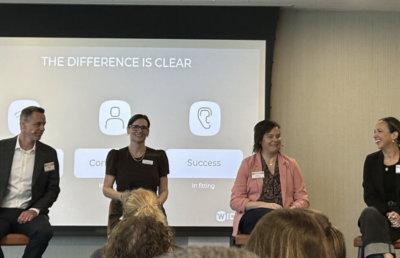Research reveals that mild hearing loss doubled dementia risk, moderate loss tripled risk, and people with severe hearing impairment were five times more likely to develop dementia. If you’ve been experiencing changes in your hearing, understanding the connection between hearing loss and brain health becomes crucial for protecting your cognitive well-being.
The relationship between your ears and your brain extends far beyond simply processing sounds. Brain scans show that hearing loss may contribute to a faster rate of atrophy in the brain, creating a cascade of changes that can affect memory, thinking, and overall cognitive function. When you understand these connections, you can take proactive steps to protect both your hearing and your mental sharpness.
The Science Behind Hearing Loss and Cognitive Decline
Hearing loss is estimated to account for 8% of dementia cases, meaning that hearing loss may be responsible for 800,000 of the nearly 10 million new cases of dementia diagnosed each year. This staggering statistic highlights why addressing hearing changes early matters so much for your long-term brain health.
Available evidence confirms that hearing impairment is an independent and modifiable risk factor for cognitive decline. Unlike many other risk factors for dementia, hearing loss represents something you can actively address through proper treatment and intervention.
How Your Brain Responds to Hearing Loss
When you experience hearing loss, your brain undergoes several significant changes. Hearing loss can make the brain work harder, forcing it to strain to hear and fill in the gaps, which comes at the expense of other thinking and memory systems.
This increased cognitive effort creates what researchers call “cognitive load.” The Cognitive Load Theory suggests that when individuals with hearing loss struggle to comprehend speech or other auditory cues, their brains allocate additional cognitive resources to the auditory processing task. Think of it like your brain’s processing power being diverted from memory and thinking tasks to simply understanding what people are saying.
Physical Changes in the Brain
Brain Atrophy and Structural Changes
Peripheral hearing impairment is independently associated with accelerated brain atrophy in the whole brain and regional volumes concentrated in the right temporal lobe. These physical changes occur gradually but can have lasting effects on your cognitive abilities.
Individuals with baseline hearing impairment had accelerated rates of atrophy in whole brain and temporal lobe gray matter volumes, with whole brain volumes declining by 8.4 cm³/year versus 7.2 cm³/year in those with hearing impairment versus normal hearing.
The areas most affected include regions critical for memory and cognitive function. Poor hearing performance was significantly associated with lower volume of the temporal cortex including the superior temporal auditory association cortical areas, hippocampus and precuneus, which are the most vulnerable brain regions related to dementia.
Understanding the Mechanisms
Hearing loss can directly have negative effects on the brain’s structural integrity, with constant reduced auditory stimulation of parts of the brain causing parts of the brain to begin atrophying faster, and a shrinking brain is not good for brain function.
Mediation analyses showed that brain atrophy and tau pathology mediated the association between hearing impairment and cognitive decline. This means that the physical changes in your brain help explain why hearing loss increases dementia risk.
The Social Isolation Factor
Beyond the direct effects on brain structure, hearing loss creates additional challenges through social withdrawal. Hearing loss contributes to social isolation, where you may not want to be with people as much, and when you are you may not engage in conversation as much, and these factors may contribute to dementia.
Hearing loss leads people to be less socially engaged, which is hugely important to remaining intellectually stimulated, and if you can’t hear very well, you may not go out as much, so the brain is less engaged and active.
This social withdrawal creates a concerning cycle where reduced hearing leads to less social interaction, which in turn reduces the cognitive stimulation your brain needs to stay sharp.
The Protective Power of Treatment
Hearing Aids Make a Difference
The encouraging news is that addressing hearing loss can significantly impact your cognitive health. Hearing aids cut the rate of cognitive decline by nearly half in older adults at high risk of dementia.
All three theories suggest that treating hearing loss with something as simple as using a hearing aid could directly modify or affect those pathways and reduce the risk of cognitive decline. This represents a powerful tool you have available to protect your brain health.
Early Intervention Matters
Hearing aid users wait, on average, 10 years before getting help for hearing loss, but during that time, communication with loved ones becomes more difficult, and isolation and health risks increase, making it important to be proactive in addressing any hearing declines over time.
The sooner you address hearing changes, the better you can protect your cognitive function. Hearing aids, cochlear implants or other assistive devices can significantly reduce the risks of cognitive decline associated with hearing loss by improving auditory clarity and alleviating the cognitive burden.
Comprehensive Hearing Care at Northwest Speech and Hearing Center
When you’re ready to take action for your hearing and brain health, comprehensive evaluation becomes essential. Our hearing evaluation services provide thorough assessments that go beyond basic hearing tests to understand how hearing changes may be affecting your daily life and cognitive well-being.
At Northwest, we understand that hearing loss affects more than just your ears. Connecting with others can help your brain stay younger and keep you involved with life. Our approach focuses on helping you maintain those vital connections through personalized hearing solutions.
Modern Technology for Better Outcomes
Today’s hearing aids and cochlear implants are smaller and less conspicuous than ever before. The advanced hearing devices we offer are designed to provide clear, natural sound quality that helps reduce the cognitive effort required for understanding speech.
There is a breaking-in period as you and your central auditory system and brain adjust to life with hearing aids, which is why most doctors and hearing centers include a trial period, so you can be sure the type you’ve chosen is right for you.
Prevention and Protection Strategies
Protecting Your Hearing
To help reduce the potential brain health risks linked to hearing loss, it is essential to adopt preventative measures, including avoiding exposure to loud noises, utilizing hearing protection during activities involving high sound levels, and going for regular checkups.
Our hearing loss prevention tips provide practical guidance for protecting your hearing in various environments and situations.
Staying Socially Connected
Interacting with family and friends, and participating in social activities, is important for keeping your brain healthy as it helps stimulate cognitive function and maintain optimal brain function, and restoring hearing abilities can improve social engagement, thereby enhancing cognitive stimulation and reducing the risk of cognitive decline.
Taking Action for Your Brain Health
The connection between hearing loss and brain health represents both a challenge and an opportunity. While untreated hearing loss can accelerate cognitive decline, proper treatment offers significant protection for your mental sharpness and overall quality of life.
Hearing loss is very treatable in later life, which makes it an important public health target to reduce risk of cognitive decline and dementia. You have the power to take action that can protect both your hearing and your cognitive function.
Don’t wait to address hearing changes. The amelioration of hearing positively improves both attention and memory functions. Every day you delay treatment is a day your brain works harder than necessary to process sound and understand speech.
Contact Northwest Speech and Hearing Center to schedule your comprehensive hearing evaluation. Our experienced team of Doctors of Audiology is ready to help you understand your hearing health and develop a personalized plan that protects both your hearing and your cognitive well-being.
Your brain health is worth protecting, and we’re here to help you take that important first step.
Frequently Asked Questions
Can hearing loss really cause dementia?
Epidemiological studies suggest that hearing loss may be the largest contributor to dementia out of all known risk factors. While hearing loss doesn’t directly cause dementia, it significantly increases your risk through multiple pathways including brain atrophy, increased cognitive load, and social isolation. Studies utilizing 168,183 participants from three independent cohorts identified that hearing impairment was associated with cognitive decline, brain atrophy and tau pathology, and hearing impairment is related to the risk for cognitive decline, brain atrophy and tau accumulation.
How quickly does hearing loss affect brain health?
The effects develop gradually over time. Pathological changes, such as neurofibrillary tangle (tau) and brain atrophy, occur a decade before dementia, and it is possible that hearing impairment is associated with the pathological changes resulting in dementia. This is why early intervention is so important – addressing hearing loss before significant brain changes occur can help protect your cognitive function.
Will hearing aids actually help protect my brain?
Yes, research shows significant benefits. Older adults at greater risk of dementia may be able to decrease their risk of cognitive decline by nearly half by using hearing aids, according to a study that is the first randomized controlled trial to clarify whether intervening with hearing aids would diminish the risk. The whole reason we treat hearing loss is to keep people engaged, and from a proof-of-concept perspective, hearing aids and hearing treatment can make a difference, which is what we’re seeing with the results of trials.





